#if i cook then i do not have energy or executive function to eat
Explore tagged Tumblr posts
Text
Thank you @beaniebaneenie your tags pass review!

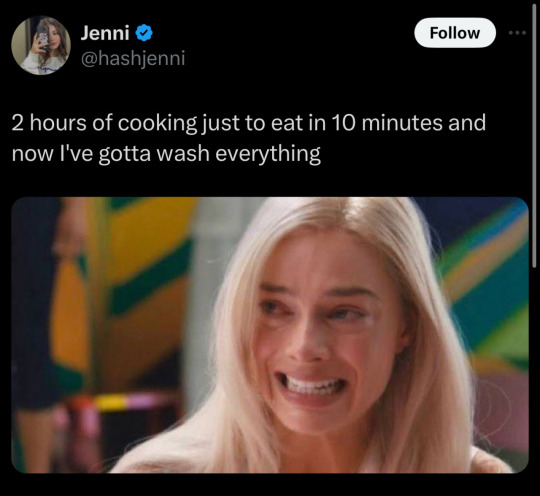
i had to make a solution for this for myself, mostly because of depression, but it makes a nice How To for folks who are low on spoons or could use some help in the kitchen.
Fortunately i was a professional cook for over a decade. UNfortunately the first post i made explaining it was suuuuper long. Let's see if i can do better
So you select any protein that you can cook in a frying pan -- chicken breasts, ground beef, pork chops, sausages, steak, chicken thighs, whatever. You also select one or two types of veggie (mushrooms or tubers also work, i just did this with potatoes and carrots for dinner tonight).
[i like cooking for vegetarians, but this is how i cook for myself when i'm low on spoons - perhaps i'll do another post for meatless meals]
You'll also need some kind of oil, and a sauce or two of your choice in a bottle. All cooking gear is a large frying pan with lid (i prefer non-stick) a spatula, a cutting board, and a knife.
You cut the veggies into bite size pieces, cut up enough for two meals. One kind of veggie is fine, or you can do mix two or three
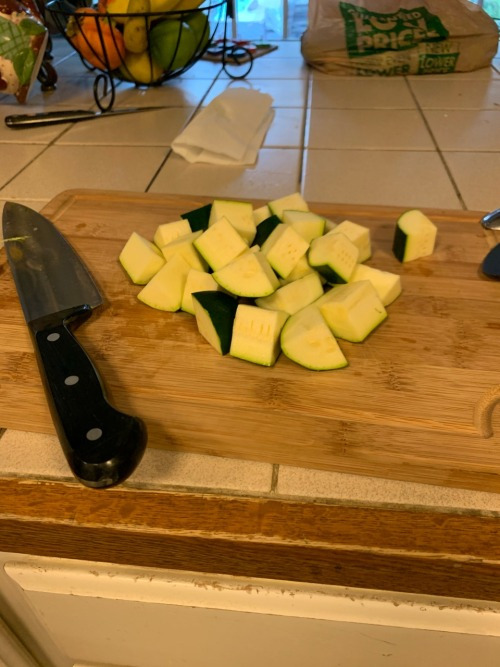
Put frying pan on medium heat with a little oil. Tubers or mushrooms or go in the pan a few minutes before the protein. 2 portions of the protein goes in the pan, about 5 minutes with lid (don't worry you can still get a good sear on both sides)
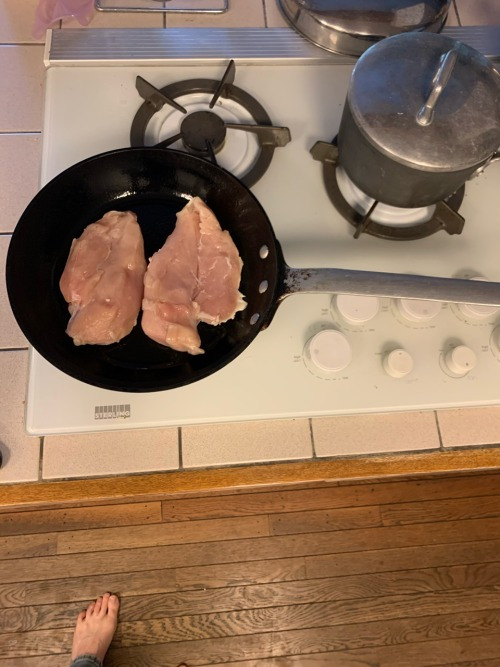
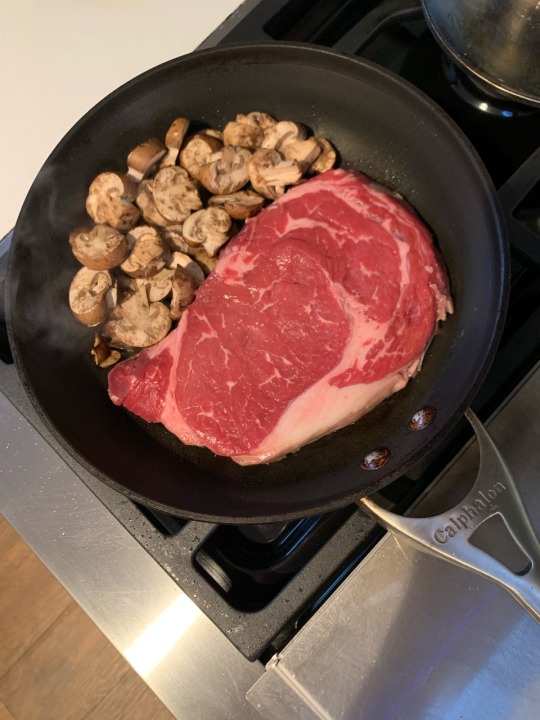
Now flip your protein if it's flip-able and add normal veggies, put the lid back on another five-ish minutes.
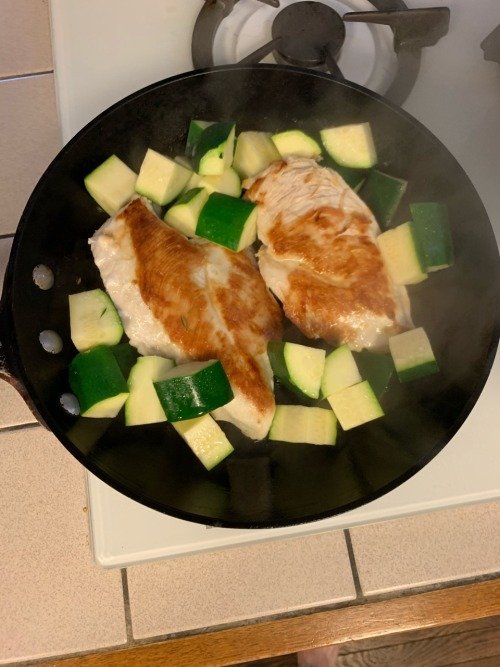
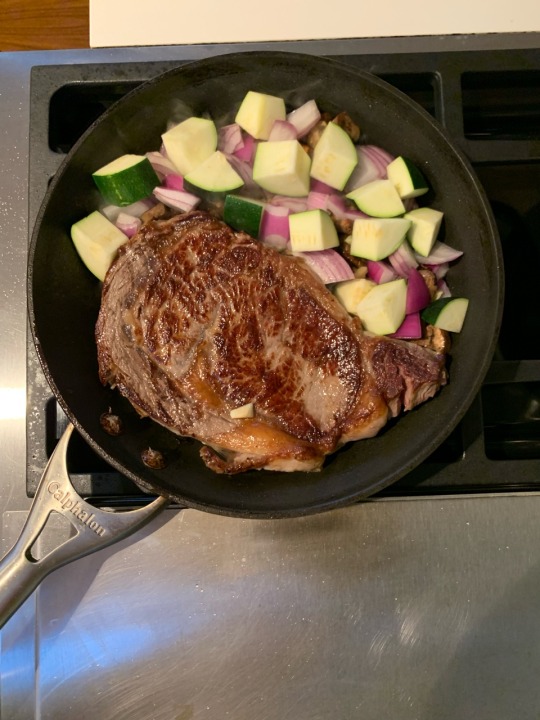
Take your protein out and put it with one portion of the veggies in a microwave safe container. That's going to be your lunch tomorrow. Put the other portion of protein on a plate to rest (you have to let a cooked protein sit a couple minutes before you serve it or when you cut into it all the juices run out and it goes dry - the liquids thicken as it cools, preventing this drying out if you let it rest, the goal is to serve it very warm but not hot hot)
While it's resting, pour some sauce from your bottle in the pan with the rest of the veggies and turn up the heat. A single sauce/bottle is fine, i like to get fancy and mix a couple. Two examples of personal favorite mixes are 1: bbq sauce and a hot sauce like sriracha 2: roughly equal parts low sodium soy sauce and worcestershire (makes something similar to a teriyaki sauce) A swallow of wine is almost always a great option if you want to add that to your sauce too, just add it to the pan before the other sauces so the alcohol has time to burn off.
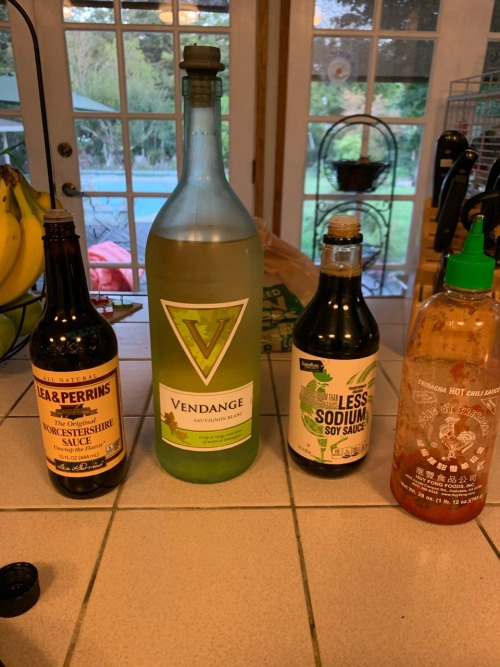
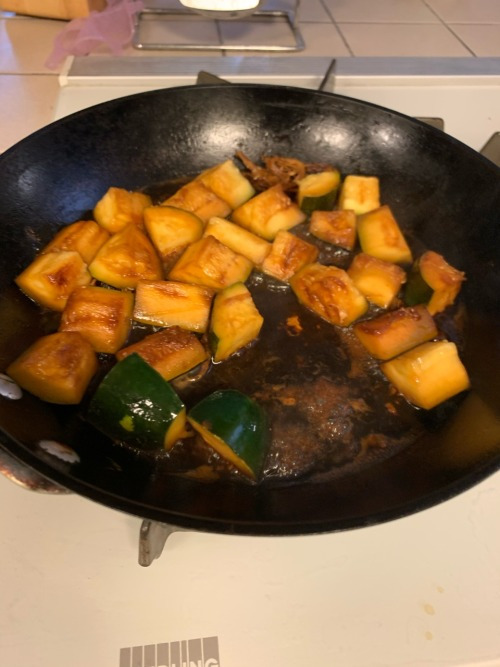
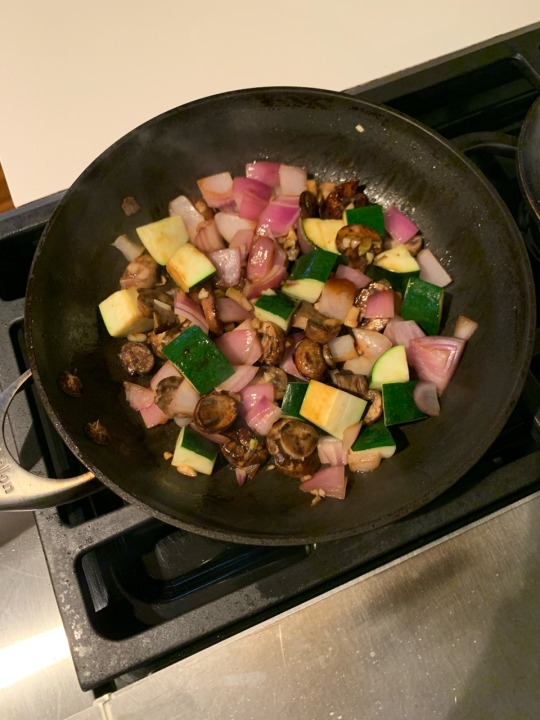
...
Here is the important bit. While your veggies are finishing, wash your cutting board and chef knife. Then when you dump your veggies and sauce over your protein on the plate, while it is still too hot to eat, you wash your frying pan and spatula before you eat. Now the only dishes you have left to do are your plate and fork. Maybe a steak knife.
...
The whole thing takes about 35 minutes even with washing the dishes, and that includes your lunch for the next day- just pour a different sauce on and stick it in the microwave for a couple minutes (or five minutes back in the frying pan) and you have a full healthy lunch with a different flavor
You can use this technique every single meal and it yields hundreds of combinations, from pork and potatoes bbq, to salmon and broccoli teriyaki, to chicken and zucchini in a soy glaze.
It will keep you down to less than an hour of kitchen time per day total for both lunch and dinner including all dish clean up, uses the least dishes, the least effort, requires the least technique, and is, depending on what you pick out, very affordable
here are a couple more examples from this month; i didn’t take pictures of the salmon i did recently, but you get the idea
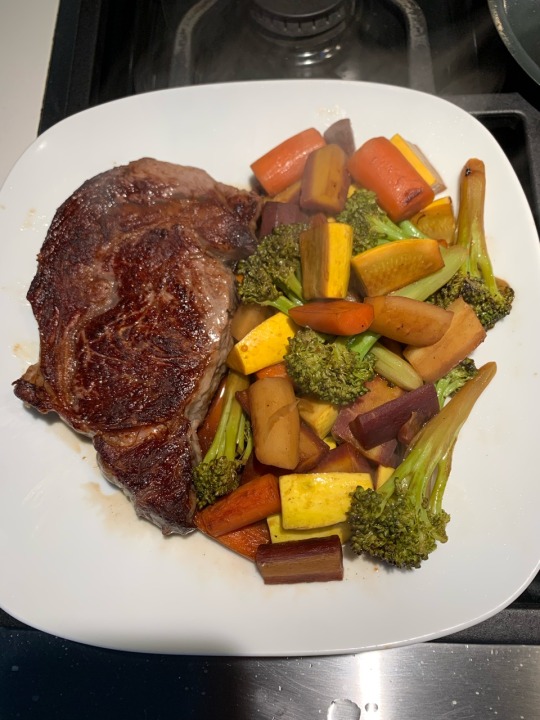
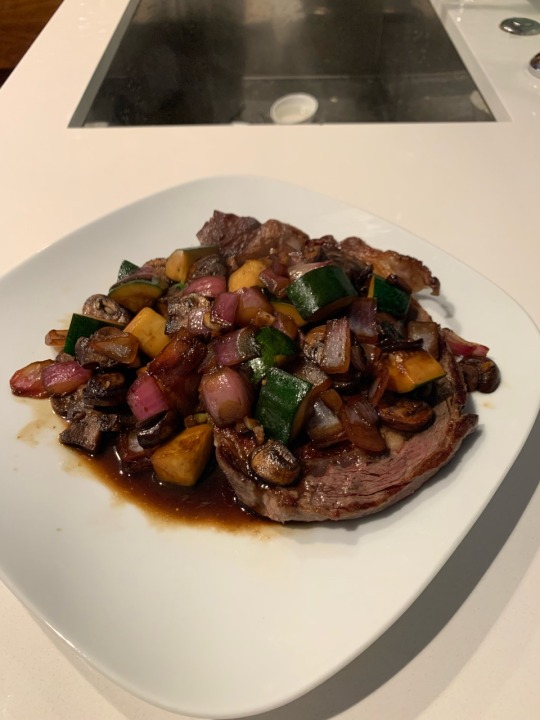
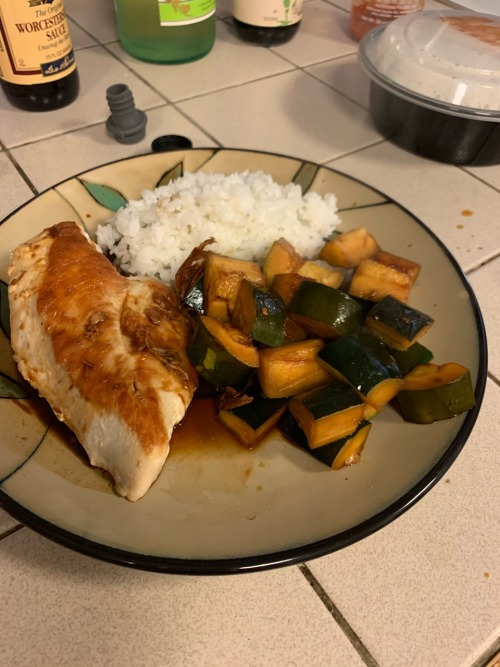
it's not super fancy, but it is easy, affordable, quick, and any flavors you want. Hope this helps some folks
Happy Cooking!
#this is a good post with good information but being real fucking honest? 35 minutes to make food is not a Low Spoon activity#when i do have the spoons to cook i try to make at least 2 meals at once#but i also always have paper plates in the house (paper bowls too) because on actual low spoon days i cannot wash dishes#there are many days i have energy to EITHER cook OR eat#if i cook then i do not have energy or executive function to eat#if i eat then i don't have the energy to cook or clean#low spoon cooking methods need to be 10 minutes or less#and a lot fewer steps#i got tired just reading this post and thinking about all the steps involved#low spoon meals need to be 3 steps or less and under 10 minutes#disabilities#disability meals#actually disabled#spoonie meals#spoonie
25K notes
·
View notes
Text
this should not be a discovery about me, and yet I've never actually added up the parts of the whole, but the one way to get instantly on my good side is to feed me.
so many people-- friends, family-- who want to get me things or do something for me when gift giving or similar events arrive and like. It's really easy. give me food.
#making myself food is the one thing i consistently struggle with#just on a purely spoons/executive function expense basis#lots of time I have gone hungry in spite of the fact that there food in the house#not because it don't know what to make or how to make it#but simply because the amount of energy and mental capacity I would need to allocate in order to DO that simply isn't there#I can organize myself into doing nearly any other task!#no matter how finicky or arduous#and I have cooked I can cook i'm quite good at it#but the bandwidth isn't there most days!#so you feed me#you give me food I can eat without having to make it myself#I am instantly your friend
14 notes
·
View notes
Text
Not having my adhd medication for 2+ days sucks ass, bc it's the only thing keeping me awake sometimes, so I get out of classes and just fall asleep for about an hour, wake up again and check tumblr and discord, am too tired and executively dysfunctional to start anything engaging, so I fall asleep again... rinse and repeat for a few hours. I got lucky tonight that my dad texted me saying he was starting to watch an episode of Black Sails and I was both hungry and had promised to keep pace with him so we can watch the end of season 2 together when I'm home for spring break, so I did that and ate some goldfish crackers.
#the hard thing is that I know if I ate healthier i would have more energy but there is no food they serve here that appeals to me.#and at home it's not much better because my brain is convinced that anything that takes longer than 10 minutes to make isn't worth eating.#but at least at home there's things I can heat in the microwave or the air fryer or leftovers from someone else cooking or something.#I do have a microwave here on campus but I have no access to a store to buy anything fresh nor any way to say... cut up carrots or whatever#so the microwave basically gets used for leftover pasta from if my parents come and take me out to my fave italian restaurant#or those little microwave mac and cheese cups bc I eat those for dinner about once a week. Which is really the only time I eat a true dinne#anyways. The more important problem is that it's incredibly annoying to finally be free from classes after a long day and all you can do is#sleep. I hate it so much. I want to have both energy and executive function so I can get shit done be it classwork or personal fun stuff.#morrigan.text#delete later#personal#vent tw#I'm fine if I go one day without the meds.#it's two or more days when things start to dissolve into sleepiness hell. No clue why that's the case since it's supposed to not last long.#anyways. I'm going to bed now which is the earliest I've gone to bed in probably months. 😭#unfortunately I have to be up at 8:30 tomorrow and I won't get a good chance to eat my beloved bagel and cream cheese#man this semester is fucking miserable. I wanna go home. I don't wanna be here and I don't wanna do any of this bullshit.#I realized that doing an internship this summer means I won't be living with any of my cats this summer and that makes me so fucking angry#and depressed that I can't stand it. I need to see cats often. I want to see MY cats often. I don't want any other cats. Just my babies.#I want to rub Loki's belly and play fetch with Charlie and get yelled at by Sylvie and pick up Ollie and carry him around...#It's been just over two weeks since I've seen my cats and I'm already missing them so fucking much I wanna die.#or rather. I don't want to die because that would mean not seeing my cats.
1 note
·
View note
Text
Prescriptive diet culture, especially (but not exclusively) the sort aimed at losing weight, is ableist and sizeist, with frequent undertones of racism, classism, and sexism. It relies on the premise that all bodies can and should fit into a certain size and a certain range of “health” and ability, that fat and disabled bodies are inherently lesser, and frequently relies on patronizing or limiting the options of poor people for their alleged “own good,” stigmatizing or patronizing the food choices of non-European cultures, and judging women’s and perceived-women’s bodies more harshly than men’s bodies.
In response to this, various fat liberation, body positive, and health-at-every-size movements have arisen to challenge this narrative to varying degrees. One of the alternatives often promoted in these contexts is “intuitive eating,” in which people eat what their bodies crave, whenever they’re hungry, instead of following a prescriptive diet or schedule. This is framed as radical, liberatory rebellion and self-actualization against diet culture.
Intuitive eating is great for some people. However, there are some problems with promoting it as a universal solution.
First of all, “Everyone should eat intuitively” is just as prescriptive as any other prescriptive diet. It still frames food choices as something with a right and a wrong answer. What superficially sounds like “Eat whatever you want” actually becomes “You must eat whatever you want, and examine carefully whether you actually want it, and defend your choices accordingly.”
Secondly, intuitive eating is fundamentally inaccessible to the majority of the world’s population. Perhaps if we lived in a Star Trek universe where we could just command a replicator to create food and have it instantly ready for us, then most, if not all people, could eat intuitively. But in our own world, our food choices are constrained by time, money, and availability, as well as restrictions like allergies and sensitivities.
When I think about what food I want to eat, I have to think about what I already have. What I can afford to buy. What I have the time and energy to prepare. I might “intuit” that I crave a steak, but what I have readily on hand is a bowl of cereal. Intuition won’t help someone with chronic fatigue who can’t stand at a stove for long or chop vegetables, or someone on food stamps who has to stretch their budget, or someone who works long shifts and comes home exhausted, or a parent of three children with food allergies who only feeds themself leftover scraps from feeding them. Who has time and energy to cook a meal from scratch? Who has money to go out to a restaurant? Whose invisible and underpaid labor -- farm workers, grocery workers, restaurant cooks, homemakers -- does this system rely upon?
The third problem with promoting intuitive eating as a universal solution is that many foods are manufactured in such a way as to sensorily mislead the eater about their properties. The idea that “artificial” or “processed” foods are somehow “worse” than “natural” foods -- or that those are meaningful categories -- is ridiculous and baseless. However, it is a fact that many foods are made to mimic the look, taste, smell, and texture of foods they do not actually contain. This makes it harder for eaters to “intuit” a food’s properties by the usual means. Eaters may have to rely on ingredients lists and nutritional information rather than sensory input alone. This is especially true for people who have specific nutritional needs, like allergies or nutrient deficiencies, to either avoid or seek out specific food attributes.
Finally, even if all other obstacles were eliminated, some people are just not good at intuiting their own food needs. People with executive functioning disabilities may forget that they’re hungry, or not recognize their bodies’ hunger signals. Not everyone is naturally good at piloting a meat suit. Food is difficult, and it’s okay to need external reminders to refuel.
Intuitive eating rhetoric can sound suspiciously similar to the common rhetoric of the “natural” “wellness” movement, stemming from the premise that all bodies are born with a natural alignment to a certain standard of “health” and normative ability, and only external factors and individual choices can “corrupt” it. In reality, there are no normative bodies or abilities. Plenty of people are born with food-related disabilities, whether difficulty remembering to eat, anxiety, susceptibility to nutrient deficiency, allergies, diabetes, or all kinds of other conditions. Food is hard. Harder for some people than others. And that’s okay.
There’s nothing wrong with intuitive eating, but it’s not a universal solution to everyone’s food difficulties. We need affordable, accessible food for everyone. We need everyone to have the free time and support they need to perform all activities of daily living. We need living wages for everyone at every part of the food supply chain. We need clearly labeled food ingredients and nutritional values. We need a society where everyone has the resources, time, and support to eat whatever they want, and the information to know what they’re eating. And then, maybe, intuitive eating can be a more attainable goal for people who want it.
We also need a society in which bodily autonomy is respected, and people’s food choices and other health and bodily choices are rightly regarded as no one else’s business. We need widespread recognition that there’s no standard of health or ability that anyone “should” have and no way that anyone “should” eat, and that what matters is ensuring that everyone has equitable access to resources, which each individual can choose how to use, whether that’s eating frozen dinners every day, growing vegetables for fun, eating only purple things, or using a timer to remember when it’s time to eat. But until we achieve that society, “intuitive eating” might as well mean “let them eat cake.”
287 notes
·
View notes
Text
This is a reminder to those who struggle with the idea of putting together meals (be it low energy, depression, feeling overwhelmed etc), you don't have to make a regular meal in order to eat! There are lots of pre-made/easy to make options out there that are healthy, filling, and taste good!
Bolthouse Farms pre-bottled smoothies (or any brand pre-bottled smoothie) are a great go-to to for breakfast (the strawberry parfait smoothie is a big favorite of mine)
For a snack, I love grabbing some carrot sticks and the individual ranch dip cups you can buy and the supermarket.
I'm also obsessed over the microwavable mini-potatoes that come with seasoning packets (found in the produce section). Pop that sucker in the microwave for 5 minutes and bamb you got yourself 3-4 meals of potatoes right there.
Yogurt is a great fast and easy option as well (Chobani has the really yummy flip cups that come with toppings such as cookies and cream, salted caramel, and key lime pie).
If you want more snacky food, Quaker Oats has a really yummy Salted Caramel rice cake chips (I used to think rice cakes were gross, but these are fucking fire I almost ate a full bag this morning).
Another great snack is fruit, either dried or fresh! I have a pack of raspberries in the fridge and a bag of apple chips in my snack drawer ready to go.
If you want actual meat, I buy my meat pre-cut (so I don't have to do all the work) and I just mix it up with a seasoning packet (supermarkets have tons of different seasoning packets for meat) and throw it in the air fryer.
Microwavable Minute Rice Cups!! It's a really fast and low-effort way to put together a side of rice for a meal! They come in packs of two individual microwavable cups of rice, all you gotta do is pop it in the microwave for a minute.
Getting tired or sick of drinking water? Grab some Powerade. Yes, it has sugar, but it also has electrolytes your body needs and will still keep you hydrated. I *hate* water, so Powerade/gatorade is an easy way for me to stay hydrated. I always keep a bottle in my backpack and one on my nightstand. You can also try Liquid IV, but I'm not a fan of the salty taste that goes with it. Buuuut there are Sour Patch Kid flavored ones that don't taste too bad 👀 The bottom line is, go for whatever will keep you hydrated.
I've struggled with chronic illness and low energy for years, as well as having essentially no executive function thanks to my ADHD, so cooking or putting together traditional meals has been really difficult. These are just the foods that have been easy for me and I know it won't fit everyone's criteria, but I hope it helps some folks out who are looking for some low effort and easy meals/snacks!
#travis talks#food#low spoons#easy cooking#low spoon cooking#mental health#cooking#low energy#health#chronically ill#these are just some ideas that have worked out well for me and I hope someone finds them useful!
14 notes
·
View notes
Text
For the most part I would be fine if I lived alone even though it’s not preferable, but the one thing that I’d be fucked on would be eating regularly. Cooking anything more than reheating leftovers or making a pb and j requires a substantial amount of energy for me, but it’s fine if I’m with someone because I get energy being around people also doing the same things as me, and it also keeps me on a regular schedule, with dinner or lunch at x time. Without that, I’ll just procrastinate eating until I’m starving, and then I won’t have the executive functioning to make anything. To make matters worse, while I have instant ramen and a couple other quick foods, my brain won’t let me eat them because they’re solely for my work lunches, and I know if I eat them I won’t restock them and will be scrounging during the week.
Anyway, all this to say that my roommate is napping and I just tried to convince myself that a banana and yogurt counts as a lunch (it does not)
4 notes
·
View notes
Note
do you have or know of any tips for gaining when you have trouble feeding yourself reliably (autism) and/or a lot of sensory issues/food specificity? (also autism)
okay so like, this isn't an exact science but the general community consensus on how to gain without resorting to really harmful ways to force your metabolism down is to just eat lots, with a wide variety of nutrients and a moderate focus on protein and carbs. so that's likely your goal. now, how you get there in your situation is through the same techniques that anyone with your problems uses in order to eat more regularly. you should work with your sensory issues and preferences rather than against them, and find ways to make cooking as easy and accessible as possible.
i don't know of any particular ones off the top of my head (followers, help finding links would be appreciated), but i know that there are a lot of low-effort/low-spoons cookbooks out there. find ways to reduce the number of steps in cooking, the complexity of the steps, and the amount of cleanup.
i'll also say that, as someone with executive functioning issues (autism as well), cooking is a skill that starts taking less effort and fewer spoons with time and practice. a few years ago, it always took me a ton of effort to force myself to get up and make any sort of meal even if i was feeling ravenous, but now with basic meals, i hardly have to think about it at all, and i actually find the act of cooking reinvigorating rather than a drain on my energy! cooking is no longer something i procrastinate on, and i find it quite relaxing to do. i promise it will get easier!
#also i got off adderall and started smoking weed which both increased my appetite massively#but please if you are reading this THINK VERY CAREFULLY BEFORE FOLLOWING MY EXAMPLE HERE#if adderall is strictly necessary to your ability to function as a person do not stop taking it just because some gainer on tumblr did so#also weed can negatively impact your executive functioning and moreover can make you more paranoid#and even exacerbate psychosis if that's something you experience#so like#taking away adderall and adding weed really helped me but PLEASE consider the pros and cons very carefully before trying that yourself#elise.rtf
14 notes
·
View notes
Text
Non-graphic/not "gross" medical vent ahead, feel free to chime in if you've ever encountered any of this and have suggestions
My consistent fatigue, executive function issues, and randomly cycling ability to Complete Tasks is really starting to bring me down I fucking hate it so much so much so much :( I'm capable of having like three good "productive" days in a row and then I am miserable and useless for 2 weeks
Working from home is the only thing keeping me from a totally fucked up life because I can conserve my energy enough to actually get an occasional chore done or meal cooked
But truly like I have to plan my entire life around how much it "costs" me to go talk to a friend, clean my room, post about my art on social media
Idk what to do. I have a CPAP machine now so my sleep quality should have improved, I've been on Wellbutrin for years and just got my dose increased, I get 9 hours of sleep per night and eat a balanced diet, I don't overuse caffeine.... And yet my body is constantly buzzing with discomfort and exhaustion and my brain fog is so bad that I struggle to form sentences sometimes
My general doctor just made me a referral for an adhd evaluation and I'm gonna try to wean myself off of smoking weed every night even though I think it's the only thing that lets me sleep
We'll see what happens
2 notes
·
View notes
Text
Real talk: sometimes I drink Huel for dinner and it's one of those things people mock because it has Bro marketing, but premade Huel, I am convinced, is for disabled people, successfully marketed to the ableds to be profitable.
It can be a GENEUINE CHALLENGE to decide on, have food in for, prepare, and make a meal. That is a lot of executive function you need there, not to mention strength, energy, and ability to stand or sit in a kitchen for prolonged periods. Yes, even that simple meal you're thinking of.
Huel is nutritionally complete. It's not a diet drink; it has plenty of calories. And while it's not the most exciting thing to consume, it does come in several flavours and is perfectly fine for the times when you Just. Can't.
I wouldn't have it for every meal. I prefer fresh food and freshly cooked food, as most people do, but keeping 2-3 bottles in the house for the Bad Days has been a life saver, and better than things I have done in the past when fatigue was bad, like eating crisps and dip for dinner, or bread and hot sauce. Or Pot Noodles.
Basically, we have sci-fi human fuel and it's a good thing, actually. Just don't have it every time.
so tired of having to cook and trying to figure out wtf to eat, can I just have like. Specialized human dog food or something, like some vegetable and protein biscuits and a special drink so that I only have to think about maybe cooking something once a day instead.
10K notes
·
View notes
Text
Here to add some hopefully helpful tips regarding the plant-eating here, and hopefully without offending anyone:
• if you live in North America, your day-to-day diet is very likely to have a lot of processed foods and sugar, as in, much of the food one can buy will have some form of sugar and flavour enhancers etc already added into it (not only North America of course, but I know how EASY they make it there).
• Add to that the fact that fresh produce is relatively expensive and time-consuming to make a nice dish with, I really understand how unappealing it can be to eat plants.
• nonetheless, good idea to eat plants. It's hard to get used to non-sweet flavouring, and instead savour bitterness or sourness or certain textures is a whole deal, and in my experience if your gut biome isn't accustomed to eating them, it'll take time to adjust and the adjustment might be physically uncomfortable.
• I used to hate preparing vegetables to eat because the end result would be so unappealing. Someone in the comments mentioned 'overcooked veg', someone else 'mushy'. As long we associate eating plants with this kind of disappointment then it's so hard to get into the habit.
So a few tips from my personal experience over the 20 years I've been cooking:
• if you are working hard and don't have the time or energy to cook healthy for yourself, but you CAN find healthy take away, do it. Don't beat yourself up about the expense, or your executive dys/function. How marvellous, humans have been buying their food from vendors for thousands of years, I shall keep the tradition alive. (*no, not deep fried foods)
• if you're cooking food yourself: veg generally doesn't need a lot, and boiling generally is not what it needs. I have a microwave steamer for steaming, oven for roasting, pan or airfryer for grilling or frying.
• Soup makers are an INCREDIBLE tool for I-have-no-time-but-want-something-nice (chop up veg, add water, 17 min later hey presto soup).
• if it is green: the brighter the green, the better (don't overcook the zucchini, chop brussels sprouts in half so they'll soften more quickly but retain some crunch, spinach truly only needs a few minutes)
• many cuisines have wonderful methods and recipes for preparing veggies. Mexican cooking, various Indian cuisines, Indonesian, Korean, Middle-Eastern, Eritrean, Ethiopian, Japanese, Chinese, etc.
• Italian and French too, though for IT it can be a faff to find delicious ingredients for the very simple seasonal dishes, and for FR it can be a faff full stop.
• Salt, pepper, olive oil, sesame oil, balsamico / different vinegars, pickles, soy sauce, tahini, oyster sauce, harissa, kochukaru, miso, shiokoji etc. Your veggies will taste best when combining with herbs, spices, other ingredients that have interesting flavour.
• Onion and garlic! Celery! Parsley, sage, rosemary and thyme! Chives, garlic stems. And dill, and tarragon, and basil, and cilantro/coriander (unless you have the soap gene), and lemon grass, curry, nutmeg, bay leaves, and ginger, and turmeric, and galangal/ laos, and lime, and lemon-- this is just what's available locally near me, depending on what shop you go to you may be blessed with other herbs. I've taken to googling recipes based on interesting looking ingredients.
• fermented things like miso and kimchi (and kombucha and cheese) can be good for the gut and will make veggies SO good, but take notice of how your bod reacts. I personally go through periods of deep craving and then periods of NO. If it upsets the tum, consider incremental increase or hold off.
• there's much to be found online. Start wherever. Ottolenghi's recipes are fun: unexpected flavours and textures, very pretty to look at, great combinations with dairy and/or meat but many stand-alone veg recipes https://ottolenghi.co.uk/recipes
• please note there's a difference between eating a vegetarian diet and eating vegetables. Plastic is also vegan, and you can eat strictly vegetarian and still get scurvy.
• find a parent or grandparent (possibly not your own) whose cooking you like and whose shoulder you might peer over and whom you might ask questions of. I never learned more than from my ex-boyfriend's parents who, with Creole and South-Asian backgrounds, cooked any and every veg with so much knowledge and talent and good taste that it was a joy to eat with them every time.
(feel free to DM me with food questions, I don't know everything but I can help with the things I do know.)
A lot of younger people have no idea what aging actually looks and feels like, and the reasons behind it. That ignorance is so dangerous. If you don’t want to “be old,” you aren’t talking about a number of years. I have patients in their late 80s who could still handily beat me in a race—one couple still runs marathons together, in their late 80s—and I lost someone who was in her early 60s to COPD last year. What you want is not youth, it is health.
If you want to still be able to enjoy doing things in your 60s and 70s and 80s and even 90s, what you want to do, right now, is quit smoking, get some activity on a regular basis (a couple of walks a week is WAY better for you than nothing; increasing from 1 hour a day of cardio to 1.5 will buy you very little), and eat some plants. That’s it. No magic to it. No secret weird tricks. Don’t poison yourself, move around so your body doesn’t forget how, and eat plants.
If you have trouble moving around now because of mobility limitations, bad news: you still need to move around, not because it’s immoral not to, but because that’s still the best advice we have. I highly recommend looking up the Sit and Be Fit series; it is freely available and has exercises that can be done in a chair, which are suitable for people with limited mobility or poor balance. POTS sufferers, I’m looking at you.
If you have trouble eating plants because of dietary issues (they cause gas, etc.) or just because they’re bitter (super taster with texture issues here!), bad news. You still want to find a way to get some plants into your body on a regular basis. I know. It sucks. The only way I can do it is restaurants—they can make salads taste like food. I can also tolerate some bagged salads. On bad weeks, the OCD with contamination focus gets so bad I just can’t. However, canned beans always seem “safe,” and they taste a bit like candy, so they’re a good fallback.
If you smoke and you have tried quitting a million times and you’re just not ready to, bad news. You still need to quit. Your body needs you to try and keep trying. Your brain needs it, too. Damaging small blood vessels racks up cumulative damage over time that your body can start trying to reverse as soon as you quit. I know it’s insanely, absurdly addictive. You still need to.
You cannot rules lawyer your way past your body’s basic needs. It needs food, sleep, activity, and the absence of poison. Those are both small things and big asks. You cannot sustain a routine based on punishment, so don’t punish your body. Find ways to include these things that are enjoyable and rewarding instead. Experiment. There is no reason not to experiment—you don’t have to know instantly what’s going to work for you and what won’t, you just need to be willing to try things and make changes when things aren’t working for you.
You will still age. Your body will stop making collagen and elastin. Tissues you can see and tissues you can’t see will both sag. Cushioning tissues under your skin will get thinner. You’ll bruise more easily. Skin will tear more easily. Accumulated sun damage will start to show more and more. Joints will begin to show arthritis. Tendons and ligaments will get weaker and get injured more easily, as will muscles. Bones will lose mass and get easier to break. You’ll get tired more easily.
But you know what makes the difference between being dead, or as good as, in your 60s vs your 90s? Activity, plants, and quitting smoking. And don’t do meth. Saw a 58-year-old guy this week who is going to have a heart attack if he doesn’t quit whatever stimulant he’s on. I pretended to believe it was just the cigarettes, and maybe it is, but meth and cocaine will kill you quicker. Stop poisoning yourself.
Baby steps; take it one step at a time; you don’t need to have everything figured out right now. But you do need to be working on figuring things out.
45K notes
·
View notes
Text
I’m having a lot of trouble feeding myself the past few days 😕
I’ve ALWAYS had food issues (I’m assuming I mostly have the autism to thank for that). The amounts of foods I will actually eat is extremely limited. Then when you factor in me always being exhausted and/or in pain, and all the executive functioning issues, it brings the list of foods I will actually eat AND will actually be able to prepare for myself down to uhm….a few different brands of frozen cheese pizzas. A few snacks. And that’s basically it.
I’ve also always struggled with interoception, including being able to tell when I’m hungry or full. Like, I won’t notice I’m full until I’m STUFFED, and I almost NEVER notice that I’m hungry until I’m getting nausea and lightheadedness and shit like that from being so hungry.
But lately, in addition to those usual issues, I’ve been having two other big issues: appetite & energy.
I have had NO appetite at ALL lately. I’ll be painfully hungry & still not be able to force down more than a few bites, even of my safe foods (which also sucks financially cuz my safe foods are not cheap, but I struggle with eating leftovers texture wise, so when I cook & can only take a few bites, the rest goes to waste. And I can barely afford groceries as it is rn).
And then I’ve also been horribly burned out lately. I’ve been pushing myself waaay too hard over the past month, and ESPECIALLY last week. Like there were points last week where I was genuinely questioning whether my body was completely shutting down from exhaustion. So right now even something as simple as throwing a frozen pizza in the oven feels too hard. Even walking to the kitchen/leaving my room feels too hard. Half the time even just having to chew food seems too hard.
So like. What am I supposed to do? I feel physically ill from hunger almost all the time, and I know not eating is deffo making the exhaustion worse & making it harder to recover from burnout. But it’s hard enough to find foods I can eat normally, I don’t know what to do or how to keep myself fed right now. I can only eat so many applesauce pouches in a day before I get sick of them. I don’t know what else to try. It sucks 😢
#putting this under a read more cuz it got waaaay longer than I expected#but yeah basically just my autism & burn out making food real hard rn#& idk what to do about it#beth posts
0 notes
Text
Ah.
#what did you eat yesterday very sweet in episode 1 but also!#surprise short-term breakdown about not being a functional human being!#fun for me! good times!#i want to make delicious food for my family but all i can do is eat cheesy snack and do clerical work and cook pre-made dreck#never any energy for real cooking never any executive function to get anything else done#ignore me i'm fine i'm fine i just gotta. talk to my doctor.#i have my annual checkup tomorrow and i am going to talk to her about my brain#maybe she'll have suggestions#bitch and moan
4 notes
·
View notes
Text
One of my big executive function struggles is feeding myself.
I live alone (apart from the cat). I lose track of time when I’m involved in a project, and I don’t feel hungry so much as tired a lot of the time, which tends to lead to the wrong solution.
I hate taking five minutes to make myself food. If I have energy, it feels like I’m wasting time that could be spent writing or researching or whatever. And if I don’t have energy… FUCK. Even peeling a banana is beyond me.
When I drove to work, pre-pandemic, this often meant Dunkin’ Donuts for breakfast, Burger King for dinner, maybe head over to the bakery for a sandwich at lunch. I’d try not to do all three on the same day, but… I never had the patience to make food.
But now I work from home in the suburbs. There’s not a lot of places in easy driving distance, and only a few of them deliver. Food I get through Uber Eats or Grub Hub arrives cold. Always. I’m signed up to one of those weekly meal delivery services but they keep raising the prices and now I’m down to 4 meals a week.
I’m not asking for money, btw. I can afford to feed myself, I just don’t have the energy.
Now, in today’s society, this is considered lazy. Inefficient. How many times have we seen people saying working class people waste their money on fast food, and don’t they realize it’s cheaper to buy and cook healthy fresh foods? And you can say over and over again about the cost of exhaustion, but there’s still this sense of “no, you should be able to do this, just like everyone always has, this generation is just lazy…”
Not just from other people. Got that voice in my head, too.
And whenever it starts to get abusively loud, I just remind myself:
Working class apartments in Ancient Rome didn’t have kitchens. Apartment blocks (insulae) had shops on the ground floor, especially bakeries and places that sold quick hot food you could eat on your way to work, maybe with a few seats along a bar where you could rest for five minutes on your break.
Not just a few. These were goddamn EVERYWHERE.
We’ve known for two thousand years that people who work all day don’t have the energy or resources to cook for themselves. Longer, because Rome didn’t invent this, it’s just well-known there cuz Rome.
Anyway. I think if as a society we just accepted that “people don’t have the energy to cook but still need healthy food” is a real and valid issue, we could find some affordable fucking solutions. And step one is to stop blaming people (and ourselves) for not having that energy.
12K notes
·
View notes
Text
Okay! @bishonenrockmysocks's combinatory (ADHD+ASD+Scrabble Sleeve of other Diagnosis) nightmare of a spouse here! I’ve also mentored and helped a number of people get diagnosis and get through the process of finding the right medication for their manifestation of ADHD, so strap in this is gonna be AN INFO DUMP.

FIRST: Overview for the uninformed. ADHD is executive function issues caused by brain development. The brain doesn’t lack the ability to think, but to execute. As a TERRIBLE therapist once said (while denying me an ADHD diagnosis): “Your brain works just fine, but to talk to you in computer terms, you just lack the RAM to run your life. Tough luck.”
This isn’t JUST being able to execute things like dishes or cooking, but also can be tied to emotional regulation, mood, and basically everything behavioral. Your brain lacks the ability to regulate itself, so your brain struggles to do most any of the things others can. I say struggle because it can do them, it just requires special conditions (usually PANIK, stress, novelty, and excitement) to do it.
Overview over! Onto the meds!
TWO: Personalizing to your brain! Everyone knows Ritalin and Adderall, but there is also Concerta and a number of other meds you can take. The big thing is that, just like with depression meds, your brain is a unique little pile of fat and sometimes certain meds just DON'T WORK.
While there are various side effect (I’ll get to them) I think it’s more important to understand a metaphor for HOW the meds work. I have three categories: Dams, Patties, and Hiring.
1) Dams control the flow of water saving it up for use or release later. This is (from my understanding) what Ritalin does. It gives you access to CHOICE. Your brain can choose to release when it wants because it has better control of how to send out that good brain juice water to the system.
2) Patties, like rice patties, flood the area giving access to water to all parts. This is (again from my experience) what Adderall does. It gives ALL parts of the brain juice to run with at all times instead of having to struggle to divert and route the flow of the good things liquid. As I’ll share later: This WENT HORRIBLE FOR ME. But that’s the reason why starting ADHD meds requires scheduled doctors visits.
3) Hiring. This is special case for those who use anti-depression meds. In this case the ability to access that sweet-sweet function liquid isn’t increased artificially via control or flood, but by literally turning on receptors in the brain like in depressed people. You're making your brain re-hire and train people who regulate the good brain juice. I haven’t tried these, but I know a number of ADHD professionals who use these meds (mainly Concerta). I cannot speak to side effects other than the usual depression meds stuff.
THREE: Side effects and finding the right meds So.... as you can tell part of the challenge of ADHD is finding what your brain needs to function. I take Ritalin LR (8 hour extended release) but, as I hinted at, I tried Adderall and my brain rebelled. Might be because of the whole dissociative disorder, but Adderall’s “flood” just made me basically manic and so focused on a singular task I was neglecting everything else (including self care like eating) for nearly a full week. I worked three 8 hour shifts, slept like 4 hours in 3 days, and had like 1.5 meals mostly of snack packs from the deli. Basically I had access to all the energy I wanted so my first thought was the thing my brain did. Even if that was ... NEVER THE RIGHT OPTION. I switched to Ritalin and it COMPLETELY WENT AWAY. That doesn't mean you're guaranteed to have the same experience and many people succeed on Adderall, but it super wasn't the choice for me.
SIDE EFFECTS - Brain Body communication restored
There are other side effects including potential loss of appetite, anxiety, and exhaustion, but I typically chock those up to the brain working?
1) Your loss of appetite is because eating and chewing give good brain juice. Your brain works better now so its usual desire to masticate weaker beings is on hold. That said your body STILL NEEDS FOOD so you have to remind your brain to stop working and eat.
2) Anxiety is weird. See, when I self-medicated with coffee, that gave the good juice but it's also a stimulant. ADHD meds are a stimulant. When you have too much stimulant your brain goes into conspiracy theory monkey-lizard mode prepping you for whatever danger you just jacked yourself for. But on meds... your brain works, your conscious mind can DO THINGS. So sometimes you will literally be vibrating with energy and anxiety because you maybe accidentally, slightly OD’ed on caffeine and your body is FREAKING OUT but your brain is chill and working. Basically, if/when you start meds go off caffeine sources (coffee, tea, soda, etc) for a few days and slowly ween back onto them (or at least go light on them) so you can feel out your new tolerance level while the ADHD meds are active.
3) Exhaustion. TURNS OUT when your brain can think and properly communicate with your body, your body will sometimes just go “GREAT! GET THE FUCK TO SLEEP!” See executive dysfuction works both ways: you get to better regulate your conscious decisions but also your body doesn’t have to deal with what amounts to an ear-pod wearing pedestrian crossing the street of a conscious mind. You're in-sync and can talk both the good and the bad. So it can be a normal side effect of the meds or just your body screaming at you as you're relearning to experience existence without ... ohhhh say a 2 quad shot of espresso you drink daily to hold on to your executive function like a drowning sailor in a hurricane.
Side Effects - Generics
Smaller things are dietary restrictions and timing. Adderall and Ritalin have a 4 hour lifespan in the body and depower and crystalize when exposed to Vitamin C. So if you use the traditional meds you have to dance around a sort of dietary restriction. That said the long release (LR) version are coated to last 8 hours and do NOT have the issue with Vitamin C. They are more expensive, but for me the convenience is worth the price.
Also ADHD meds don’t need to be “primed” like Depression meds and are typically tested in 1-2 week stints to see how you settle into them. They do their thing IMMEDIATELY and get the hell out after their time is up. There is still a “learning curve” as your body gets used to the meds, so expect to be REALLY FUCKING ORGANIZED AND/OR CREATIVE for a day or two when you first start the meds because that will help curb expectations of what they'll do in the long term until you get to the more normal experience of your body-mind reaction to the dosage in 3-7 days.
This is why you have to “ween off” therapy during ADHD medication testing. You start with a fairly intensive 1-2 week meeting to talk about your meds. Then the need to meet extends to 1 month, then 2, then 3, then 6, then a year. That said the process will start ALL ASS OVER AGAIN if you switch meds. Which is a pain in the ass but its a safety thing. Can’t fault them on that.
Uhhh.... I think that’s it? If you have more pointed questions I can try to answer them? Also I would recommend the “BIG BOOK OF ADHD” (my title not official): Driven to Distraction by Edward Hallowell. My therapist suggested it to me when I got diagnosed and it was SUPER HELPFUL showing the spread of what ADHD can do to people, and it was compassionate in its depiction of individuals with the condition.
ADHD folks and people who know ADHD folks:
Help me! I need advice.
I have now been diagnosed with ADHD in addition to already-diagnosed ASD. (I am very unsurprised.) I'm considering medication, but am concerned about:
side-effects
unhelpfulness
So, have you or someone you know tried ADHD medication? Has it been helpful? Has it been the opposite of helpful? How did you know? How did you figure out what to try? What kinds of things does it help with, and what does it not help with?
Also, when consulting with a professional who could prescribe it, how do you know if they have any idea what they're talking about?
Any advice on any of this would be appreciated. I know a lot about ASD, but my knowledge of ADHD doesn't go much beyond what I've read on the internet.
30 notes
·
View notes
Text
I honestly resent the “adhd and autism are superpowers and only struggle because of capitalism” narrative, and I find it deeply flawed and lacking in nuance to the point of being harmful.
Adhd and autism both exist on a spectrum. They are each their own cluster of traits/symptoms, and those exist in varying degrees based on the individual. Are there aspects to adhd and autism that are advantageous? Absolutely, but we can’t pretend that they exist in an advantageous way in all of us. Some people do have the “right” traits, dialed up to the “right” intensity, and that might allow them to take advantage of their neurodivergence in a way that helps them succeed.
That isn’t to say that they don’t also have struggles due to living in a neurotypical world as an adhd’er or autistic, but they might be able to overcome it. Another person may have all the adhd or autistic traits dialed up to 100, to the point that it’s too debilitating for them to take advantage of any positives that might exist. There are high support needs autistics, for one example, who regardless of whether they had to work to afford to live or not, would still need help with living. Help cooking, cleaning, bathing.
I have “severe” adhd and while I don’t have an official autism diagnosis, I know I am autistic. I never related to the energetic, social, novelty-seeking picture that is painted of people who have adhd. My autistic traits cancel out the “positives” of having adhd, while my adhd traits cancel out the “positives” of being autistic. I’m too burnt out and exhausted all of the time to put forth much mental energy. I freak out when things aren’t predictable. I can’t function if the room is too cold. I can’t eat if my food is too cold, too squishy, too chewy, doesn’t have the right sauce available, doesn’t have the drink I like with that particular food, etc. My interests are very narrow so I don’t have the typical adhd love of variety. Yet I also can’t stay organized or follow a routine. I can’t recall information properly when I need to. I’m not patient. I forget things that just happened 30 seconds ago. I can’t plan to save my life.
This also ignores that some people have no comorbidities or they only have one or two. Some have several to contend with. Some of us have learning disabilities. We aren’t all former gifted kids that just can’t follow traditional structures or sit still in class or at the office. Some of us are legitimately debilitated in all aspects of life. Some of us aren’t just struggling with going to a 9-5…some of us can’t even keep a 9-5 because of our symptoms.
Does capitalism make things significantly harder? Absolutely. But if capitalism were to vanish tomorrow, I still wouldn’t have the executive functioning to keep my space clean, to make myself food, or to stay consistent on my own chosen projects. I would still struggle with arfid. I would still have a delayed circadian rhythm. I would still struggle to make appointments and make phone calls for myself. And I would still struggle to connect with others or make friends with people who might help me with these things.
#actually autistic#actually adhd#mental health#autistic#autism#neurodiverse#adhd#adhd in women#undiagnosed autism#adhd in adults#adult adhd#actuallyadhd#actuallyautistic#executive dysfunction#severe adhd#ableism#actually neurodivergent#autistic burnout#autistic adult
3K notes
·
View notes
Text
Hummus pasta: ADHD-friendly recipe
I first stumbled upon this recipe when i was a vegan a couple years ago, and it’s stuck with me ever since for its simplicity while being nutritionally dense. Literally all you need is pasta and hummus. Of course you can add other ingredients, but the base recipe is a lifesaver when i’m lacking in executive functioning and/or energy. I probably don’t even have to write this recipe out but I’m going to anyways for anyone who needs it.
Ingredients:
Dry pasta, any kind you like and in whatever amount you want to eat. I use about 3 oz of fettuccine
Enough hummus to coat the pasta. I use 2 big spoonfuls. Feel free to go crazy with the flavor, I like roasted garlic personally
Couple pinches of salt
Optional: any seasoning you like. I use nutritional yeast
Optional: any other ingredients you want to add, such as vegetables or a protein
Steps:
Fill a saucepan with enough water for the pasta. Put it on high heat until boiling.
Add salt and pasta to boiling water.
Cook the pasta however long the packaging says to.
When the noodles are done, drain them and save about a tablespoon of the pasta water. If you forget to do this, like I did, you can just leave the noodles a little wetter. It doesn’t really matter that much.
Put the pasta back into the saucepan. Add the hummus and seasoning and stir until the pasta is evenly coated. At this point you can also add any vegetables or whatever.
Put it in a bowl and eat it. That’s it!
Hummus is really high in protein and fiber and shit. Pasta is delicious and filling. This recipe is way too easy for how good it is. You should try it!
607 notes
·
View notes